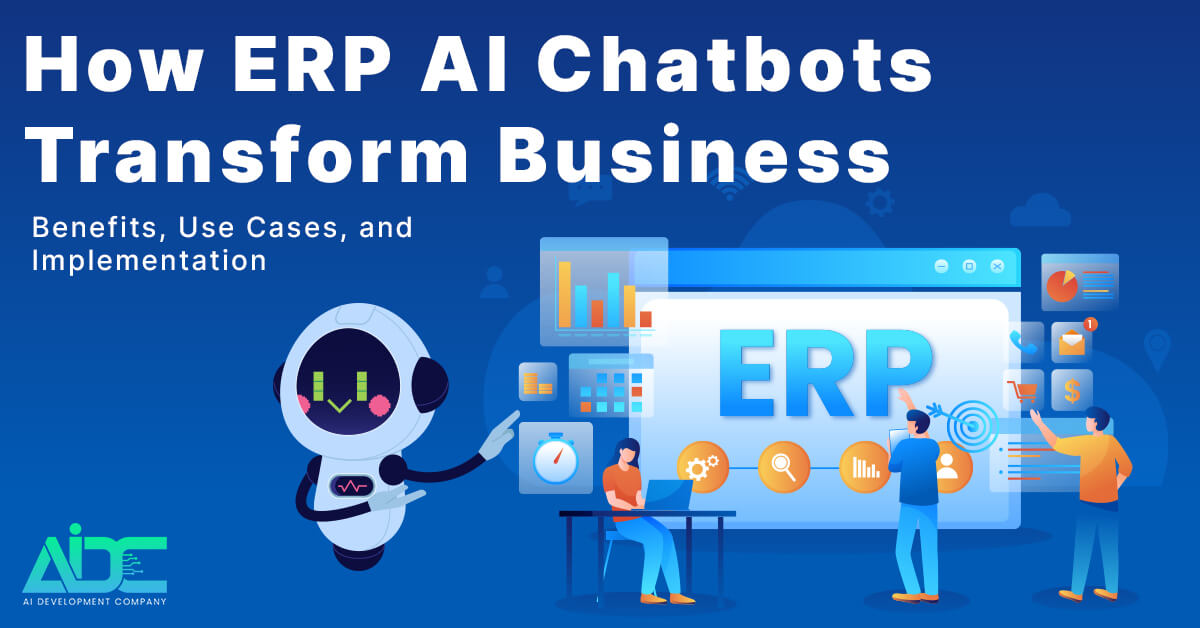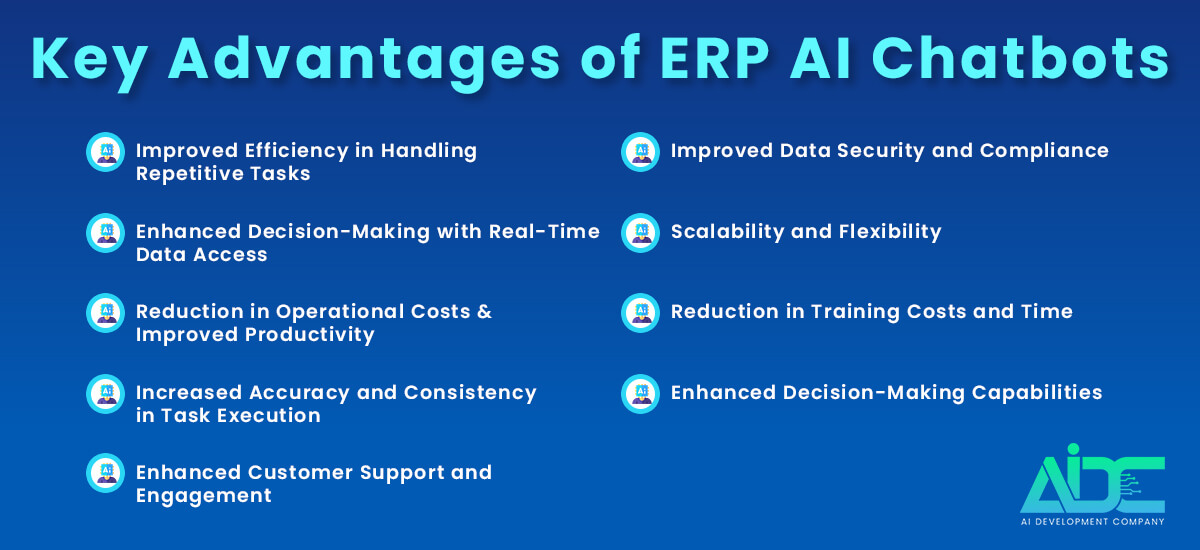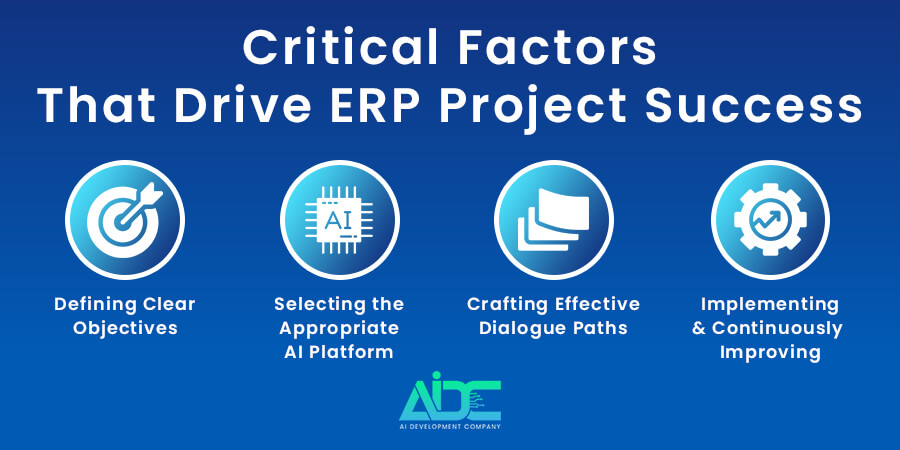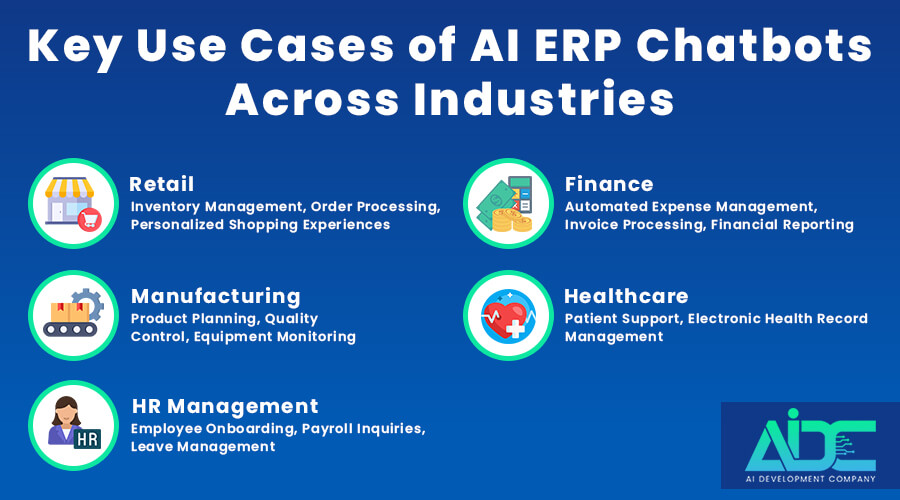
ERP AI chatbots represent a powerful fusion of artificial intelligence and enterprise resource planning systems. Designed to streamline and optimize business processes, these chatbots interact with users by providing real-time data, automating repetitive tasks, and enhancing decision-making. By integrating AI with ERP systems, businesses gain the ability to offer improved customer experiences, boost productivity, and minimize operational costs.
The importance of AI-driven ERP chatbots cannot be overstated, as they address some of the most pressing challenges modern businesses face, such as the need for immediate responses, 24/7 availability, and efficient management of complex workflows. From managing inventories to answering employee queries, ERP AI chatbots play a pivotal role in transforming how businesses operate, offering enhanced user engagement and reducing human errors.
Table of Contents

ERP AI chatbots are transforming business operations by offering numerous advantages that not only streamline processes but also enhance decision-making and reduce operational costs. Let’s explore some of the key benefits:
One of the standout features of ERP AI chatbots is their ability to manage repetitive and mundane tasks with remarkable efficiency. Whether it’s processing routine queries from employees, updating inventory levels, or handling basic customer service tasks, chatbots take over tasks that would otherwise consume valuable human resources. By automating these repetitive processes, businesses can free up employees’ time, allowing them to focus on more strategic and creative activities, ultimately boosting productivity.
ERP AI chatbots provide businesses with real-time access to crucial data, helping decision-makers stay informed and make timely choices. By querying the ERP system directly through the chatbot, users can retrieve real-time reports, track performance metrics, and analyze business trends without needing complex technical skills. This real-time access to data ensures that managers and teams can make informed decisions quickly, improving responsiveness and reducing delays in crucial business processes.
Automating tasks through ERP AI chatbots can lead to significant cost savings. By reducing the need for manual intervention in processes such as data entry, report generation, and responding to routine inquiries, businesses can cut down on labor costs. Additionally, the ability of these chatbots to work around the clock means that businesses can maintain high productivity levels without increasing their workforce. The combination of automation and 24/7 availability leads to optimized resource utilization and improved overall productivity.
Human errors in data entry or process execution can lead to significant inefficiencies and cost overruns. ERP AI chatbots help eliminate these errors by providing a consistent and accurate approach to task execution. Whether it’s processing transactions or managing customer queries, these chatbots adhere to predefined rules and logic, ensuring that tasks are executed precisely each time. The reduction in errors improves the reliability of business processes and increases the trust in the systems being used.
ERP AI chatbots provide a major boost to customer support and engagement by offering round-the-clock service with instant responses to inquiries. These chatbots can handle a wide range of customer queries, from order status updates to product information, ensuring that customers receive timely and accurate assistance. Moreover, the conversational AI enables chatbots to engage users in a personalized manner, improving the overall customer experience. By addressing customer concerns immediately and effectively, businesses can foster greater customer loyalty and satisfaction.
Data security and compliance are critical concerns for businesses in todays landscape. ERP AI chatbots help ensure that sensitive information is handled securely by adhering to strict security protocols such as encryption and user authentication. Additionally, these chatbots can be programmed to follow industry regulations and compliance standards, reducing the risk of non-compliance penalties. With automated processes in place, businesses can be confident that data is being managed securely while meeting necessary legal and industry standards.
ERP AI chatbots offer remarkable scalability and flexibility, making them an ideal solution for businesses of all sizes. As a company grows, so do its needs for managing larger amounts of data and processes. ERP AI chatbots can easily scale to accommodate this growth, handling more complex tasks and larger volumes of interactions without the need for significant reconfiguration. Whether a business is expanding operations or adjusting its services, these chatbots provide the flexibility to meet evolving demands without sacrificing performance or efficiency.
Training employees to use new systems or software can be time-consuming and expensive. ERP AI chatbots simplify this process by offering an intuitive and user-friendly interface that requires minimal training. Employees can interact with the chatbot through natural language, making it easy to access information or complete tasks without having to undergo extensive training on the ERP system itself. This leads to a reduction in training costs and time, allowing businesses to onboard new staff more efficiently.
ERP AI chatbots empower businesses with enhanced decision-making capabilities by providing actionable insights based on real-time data. These chatbots analyze patterns, trends, and historical data to offer predictions and recommendations that can improve business outcomes. For example, chatbots can forecast demand, optimize inventory management, or suggest process improvements based on past performance. By leveraging AI-driven analytics, businesses can make data-backed decisions that drive growth and success.

The success of an ERP project is determined by several critical factors that help ensure smooth implementation and optimal performance. By paying close attention to these elements, businesses can maximize the value of their ERP system and avoid common pitfalls.
One of the most crucial steps in ensuring the success of an ERP project is defining clear and measurable objectives from the outset. These objectives should align with the company’s broader business goals and outline specific outcomes the ERP system is expected to achieve. Whether it’s improving operational efficiency, reducing costs, or enhancing data visibility, having well-defined objectives helps guide the project and measure its success.
Choosing the right AI platform is another vital factor for a successful ERP implementation. The platform must integrate seamlessly with the existing ERP system while providing the necessary capabilities to meet the business’s needs. Whether it’s natural language processing for chatbot functionalities or machine learning for data analytics, selecting an AI platform that aligns with your technical and operational requirements ensures smooth integration and maximizes the potential of the ERP AI chatbot.
The success of an ERP AI chatbot also depends heavily on designing intuitive and effective dialogue paths. These paths must be context-aware and provide users with a seamless conversational experience, whether they are querying inventory levels or requesting reports. A well-designed dialogue flow ensures that users can quickly and accurately retrieve the information they need, boosting efficiency and improving user satisfaction. Regular testing and refinements can further optimize these conversational flows over time.
No ERP project is complete without a process for continuous monitoring and improvement. Once the ERP AI chatbot is deployed, it’s essential to track its performance, gather feedback from users, and make necessary adjustments. This includes refining the chatbot’s responses, enhancing integration with ERP modules, and ensuring that the system adapts to changing business needs. Regular updates and improvements help maintain high performance and ensure the ERP system delivers long-term value.

ERP AI chatbots have proven to be versatile tools that can be applied across a variety of industries, each benefiting from their unique capabilities. Let’s explore how different sectors are leveraging ERP AI chatbots to streamline operations and improve efficiency.
In the retail industry, ERP AI chatbots are revolutionizing inventory management and order processing. By providing real-time insights into stock levels, automating reordering processes, and assisting with order tracking, these chatbots ensure smooth supply chain operations. Additionally, they enhance the customer experience by offering personalized shopping recommendations based on purchasing history and preferences. Retailers can use ERP AI chatbots to create a seamless shopping experience, both online and in-store, leading to higher customer satisfaction and retention.
Manufacturing businesses benefit significantly from ERP AI chatbots through improved product planning, quality control, and equipment monitoring. Chatbots can help manage production schedules, ensuring that resources are allocated efficiently while minimizing downtime. They also assist in quality control by tracking production metrics and identifying potential issues before they escalate. Moreover, ERP AI chatbots enable predictive maintenance by monitoring equipment health, reducing the risk of unexpected breakdowns and increasing overall operational efficiency.
In the finance industry, ERP AI chatbots are being used to automate routine financial processes such as expense management and invoice processing. By handling these repetitive tasks, chatbots free up finance teams to focus on more strategic activities, such as financial planning and analysis. Additionally, chatbots can generate real-time financial reports, providing decision-makers with accurate and up-to-date information. This automation leads to faster processing times, improved accuracy, and enhanced decision-making.
The healthcare sector is leveraging ERP AI chatbots to streamline patient support and electronic health record (EHR) management. Chatbots can assist patients by providing instant responses to inquiries about appointments, prescriptions, and general health information. In addition, they help healthcare providers manage EHRs by automating data entry, retrieval, and updates, ensuring that patient information is accurate and easily accessible. Automating these processes allows healthcare providers to dedicate more time to patient care while reducing the burden of administrative responsibilities.
Supply chain management is a critical area where ERP AI chatbots are making a significant impact. These chatbots are used to optimize demand forecasting by analyzing historical data and market trends to predict future demand. They also facilitate supplier interaction by automating communication, ensuring that orders are processed efficiently. In logistics, ERP AI chatbots assist in route optimization and real-time tracking, enabling businesses to streamline operations and reduce costs associated with delays and inefficiencies.
In human resources, ERP AI chatbots play a crucial role in automating HR processes, such as employee onboarding, payroll inquiries, and leave management. New employees can interact with chatbots to receive training materials, complete paperwork, and get answers to common onboarding questions. Additionally, chatbots provide instant responses to payroll and leave-related inquiries, reducing the workload on HR staff and improving employee satisfaction. By automating these routine tasks, HR teams can focus on more strategic initiatives, such as talent development and employee engagement.
The effectiveness of ERP AI chatbots depends on the underlying technology and platforms used to build and deploy them. Businesses must carefully select the right platform based on their specific needs, integration capabilities, and scalability requirements. Below, we’ll explore some of the popular AI platforms and how they compare in terms of features and functionality.
Two of the most widely used platforms for developing ERP AI chatbots are Google’s Dialogflow and Microsoft Bot Framework.
When choosing an AI platform for ERP chatbots, businesses should consider key factors such as NLP accuracy, scalability, and integration flexibility.
When implementing an ERP AI chatbot, businesses often face the decision between using pre-built connectors or developing custom-built solutions.
While ERP AI chatbots offer significant benefits, implementing them comes with its own set of challenges. Successfully deploying and maintaining these chatbots requires addressing various technical, operational, and security-related hurdles. Below are some of the key challenges businesses may encounter during the implementation process.
One of the primary challenges in implementing ERP AI chatbots is ensuring robust security and data privacy. Since these chatbots interact with sensitive business data, including financial records, customer information, and internal processes, it is critical to protect this data from potential breaches. Businesses must ensure that their ERP AI chatbot is built with strong encryption protocols, secure authentication methods, and compliance with industry regulations such as GDPR or HIPAA. Failure to adequately address security concerns can result in data leaks or unauthorized access, which could have severe financial and reputational consequences.
Integrating AI chatbots with existing ERP systems can be complex, especially if the ERP software is outdated or highly customized. The challenge lies in ensuring that the chatbot can communicate seamlessly with the ERP platform and other business applications without disrupting existing workflows. Older systems may require additional middleware or custom integration solutions, which can increase the time and cost of implementation. Moreover, integration issues can arise when trying to align chatbot functionalities with the unique processes of the organization, making it essential to thoroughly plan and test the integration before full deployment.
AI chatbots, especially those integrated with ERP systems, require continuous updates and monitoring to maintain optimal performance. As the business evolves, the chatbot needs to be fine-tuned to handle new tasks, queries, and data sources. Without regular updates, the chatbot may become outdated or fail to meet the growing demands of users. Additionally, continuous monitoring is needed to identify and fix issues, such as inaccurate responses or slow processing times. Implementing automated monitoring tools and maintaining a dedicated team for ongoing support can help ensure that the chatbot remains effective and adapts to changing business needs.
Businesses often face the challenge of balancing customization with the need for a quick deployment. While custom-built ERP AI chatbots offer tailored solutions that meet specific business needs, they typically take longer to develop and implement compared to off-the-shelf options. On the other hand, pre-built chatbots may be faster to deploy but might not align perfectly with the company’s processes or offer the flexibility needed for future growth. Finding the right balance between customization and speed requires careful planning and consideration of long-term goals, ensuring that the chatbot can be both quickly deployed and scalable for future needs.
Successfully developing and implementing an ERP AI chatbot requires a structured approach to ensure that the chatbot meets business goals, integrates seamlessly with existing systems, and provides value to users. Below are the essential steps to guide you through the development and implementation process.
The first step in developing an ERP AI chatbot is defining clear objectives that align with your business needs. Identify the specific tasks the chatbot will handle, whether it’s improving customer support, automating internal workflows, or enhancing data access for decision-makers. Having well-defined goals will not only help in building a chatbot with relevant features but will also provide a benchmark for evaluating its success. Clear objectives ensure that the chatbot is tailored to meet business challenges and deliver tangible benefits.
Choosing the right AI platform and technology stack is critical for the successful development of an ERP AI chatbot. Depending on your business requirements, you may opt for platforms such as Google Dialogflow, Microsoft Bot Framework, or custom-built AI solutions. The chosen platform must offer flexibility, scalability, and ease of integration with your existing ERP systems. Evaluate the platform’s natural language processing (NLP) capabilities, customization options, and ability to handle high volumes of data before making your decision. The right platform will ensure that the chatbot functions effectively and can adapt to future business needs.
Designing the chatbot’s conversational flow is an important step that determines how well the chatbot interacts with users. Start by mapping out common queries, tasks, and processes that the chatbot will manage. The conversation flow should be intuitive, user-friendly, and capable of guiding users toward accurate and helpful responses. It’s also essential to focus on contextual accuracy, ensuring that the chatbot understands user inputs correctly and responds appropriately. Testing the conversational flow with real-world scenarios will help identify areas for improvement and enhance the overall user experience.
Once the ERP AI chatbot is developed, the deployment phase begins. During this stage, it’s crucial to have a well-planned strategy that includes rolling out the chatbot in phases to ensure smooth integration with existing ERP systems. Start with a pilot deployment to a limited group of users, gather feedback, and make any necessary adjustments before scaling the chatbot to full operation. Continuous monitoring is key to optimizing chatbot performance, as it helps detect issues, improve response accuracy, and ensure the chatbot remains aligned with business goals. Regular updates and performance reviews will keep the chatbot functioning at its best, delivering consistent value over time.
Real-world examples of ERP AI chatbot implementations showcase the transformative impact these solutions can have across industries. By exploring case studies from leading companies, we can better understand how ERP AI chatbots solve industry-specific challenges and drive efficiency.
Global fashion retailer H&M leveraged AI chatbots to optimize its inventory management processes. With stores and warehouses spread across various locations, the company faced challenges in maintaining accurate stock levels and meeting customer demands. By integrating an ERP AI chatbot, H&M was able to automate inventory tracking and ordering processes. The chatbot monitored stock levels in real time, flagged low inventory, and initiated reordering, ensuring that stock was always available when needed. This not only reduced the likelihood of stockouts but also minimized overstocking, leading to better inventory turnover and cost savings.
Coca-Cola utilized ERP AI chatbots to streamline its production scheduling across multiple bottling plants. The company faced challenges in optimizing production schedules due to fluctuating demand and complex supply chain logistics. By implementing an AI-driven chatbot integrated with its ERP system, Coca-Cola could analyze real-time data on demand forecasts, production capacity, and resource availability. The chatbot provided recommendations for optimizing production schedules, helping the company reduce bottlenecks and meet market demand efficiently. As a result, Coca-Cola improved its production efficiency while minimizing waste and reducing operational costs.
Across industries, ERP AI chatbots have become a critical tool in solving specific business challenges. For instance, the healthcare sector has successfully deployed chatbots to streamline electronic health record (EHR) management and automate patient support services. Retailers like Amazon have used AI chatbots to enhance the online shopping experience by providing personalized recommendations and assisting with order management. In the manufacturing industry, companies like Siemens have implemented ERP AI chatbots to manage production processes, monitor equipment health, and predict maintenance needs.
Each of these case studies illustrates how businesses can tailor ERP AI chatbots to meet their unique operational needs. By integrating AI-driven chatbots into their ERP systems, companies across industries are experiencing improved efficiency, reduced costs, and enhanced decision-making capabilities.
The evolution of ERP AI chatbots is set to continue as new technologies emerge, driving innovation and expanding their capabilities. As businesses increasingly embrace AI-driven solutions, the future of ERP AI chatbots holds exciting trends that promise to further transform business operations. Below are some of the key trends to watch in the coming years.
As AI technologies advance, we can expect ERP AI chatbots to become more intelligent, intuitive, and adaptable. Future developments in natural language processing (NLP), machine learning (ML), and AI-driven automation will enable chatbots to handle more complex tasks, understand user queries with greater precision, and provide even more accurate responses. The integration of AI with advanced ERP systems will allow businesses to not only streamline operations but also predict trends, make better data-driven decisions, and adapt quickly to market changes.
Predictive AI and advanced analytics are set to play a major role in the future of ERP AI chatbots. By leveraging historical data and real-time analytics, these chatbots will be able to offer predictive insights into business processes, such as forecasting demand, optimizing supply chain operations, and identifying potential risks before they occur. This predictive capability will enable companies to proactively address challenges, reduce inefficiencies, and make more strategic decisions. As chatbots continue to integrate with AI-driven analytics platforms, they will become an indispensable tool for data-driven businesses.
Voice-based AI chatbots are gaining traction across industries, and their use in ERP systems is expected to grow rapidly. These chatbots allow users to interact with the ERP system through voice commands, enabling hands-free operations that are particularly beneficial in industries like manufacturing, logistics, and healthcare. With advancements in voice recognition and NLP technologies, voice-based ERP AI chatbots will offer greater accuracy and flexibility, making it easier for employees to retrieve information, execute tasks, and manage workflows without the need for manual input.
As the Internet of Things (IoT) and automation technologies become more prevalent, ERP AI chatbots will increasingly integrate with connected devices to enhance operational efficiency. For example, in the manufacturing sector, chatbots could communicate with IoT-enabled machines to monitor equipment health, predict maintenance needs, and automatically schedule repairs. Similarly, in supply chain management, chatbots could analyze data from IoT sensors to optimize logistics and reduce delays. The integration of AI, ERP, and IoT will create smarter, more efficient systems that can operate autonomously and improve decision-making processes.
Future ERP AI chatbots will be designed to offer more personalized user experiences. By analyzing individual user behavior, preferences, and historical data, these chatbots will be able to deliver tailored recommendations and solutions that align with the specific needs of each user. This personalization will improve user satisfaction, enhance productivity, and lead to more efficient interactions with the ERP system. Additionally, as chatbot interfaces become more user-friendly and intuitive, businesses will be able to streamline training processes and reduce the learning curve for employees.
At their core, ERP AI chatbots function by leveraging cutting-edge technologies like natural language processing (NLP) and machine learning (ML) to understand user inputs and provide relevant responses. These chatbots are built on sophisticated algorithms that can interpret human language, recognize patterns, and offer solutions based on the data available in ERP systems.
ERP AI chatbots typically operate within a defined architecture, where they serve as an interface between users and the ERP system. Whether it’s answering inquiries about inventory levels or generating reports, the chatbot communicates with the underlying ERP platform to retrieve and present data.
Integration is key to ensuring these chatbots function seamlessly with existing ERP solutions. Businesses can implement ERP AI chatbots in both on-premise and cloud-based systems, making the integration flexible depending on their infrastructure. With advancements in API-based integrations, the process is often straightforward, allowing for rapid deployment and immediate results.
Also Read:
AI in demand forecasting: Use cases, benefits and implementation
ERP AI chatbots are rapidly transforming how businesses manage their operations, improving efficiency, decision-making, and customer engagement across industries. By integrating AI into ERP systems, businesses can automate repetitive tasks, enhance data-driven insights, and streamline workflows in ways that were previously impossible. The benefits of these chatbots, from improved customer support to more accurate inventory management and predictive maintenance, are clear, making them an essential tool for companies looking to stay competitive in today’s fast-paced environment.
As AI technologies continue to evolve, the potential for ERP AI chatbots will only grow. Future trends such as predictive analytics, voice-based interactions, and IoT integration will further enhance their capabilities, enabling businesses to unlock new efficiencies and opportunities. While challenges such as security concerns and integration complexities remain, with careful planning and the right technology choices, these obstacles can be overcome.
In summary, ERP AI chatbots are not just a tool of convenience; they are a key driver of digital transformation that will shape the future of business operations. By staying ahead of the curve and embracing these advancements, companies can position themselves for long-term success in an increasingly AI-driven world.